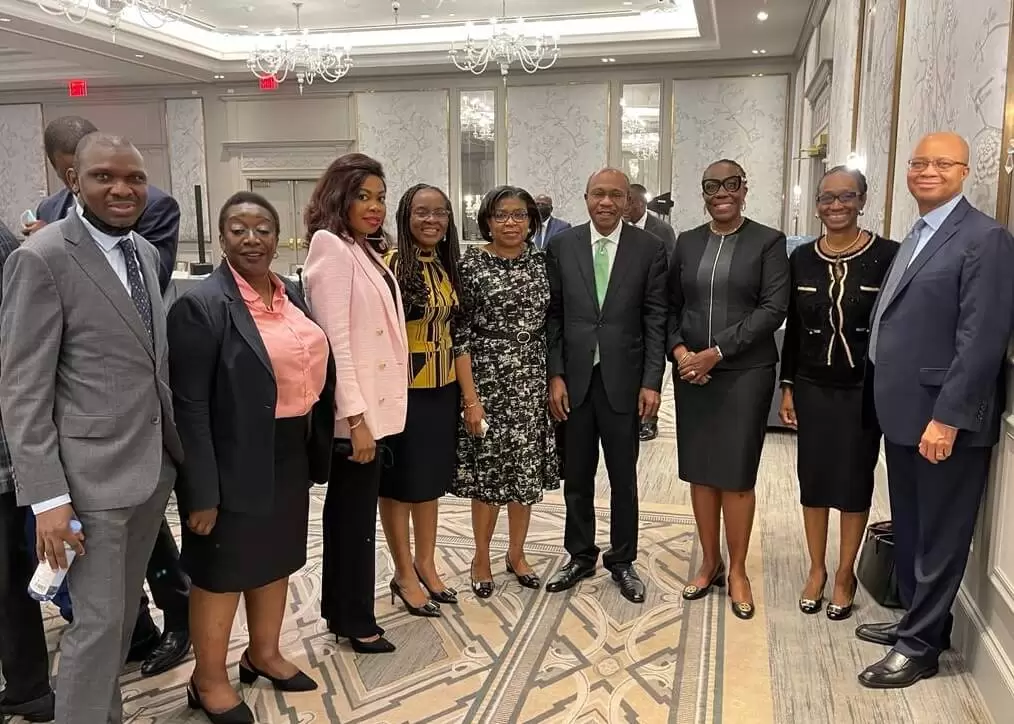Nigeria today launched its planned Eurobond issue in New York, United States of America.
Recall that Nigeria’s Minister of Finance, Budget and National Planning, Mrs Zainab Ahmed had said the country would hold roadshows for the dollar-denominated issuance, which aims to raise roughly $3bn, in Lagos and New York.
Advertisement
The government is also targeting raising the same amount via multilateral and bilateral borrowing to fund its 2021 budget deficit.
In attendance at the show is Central Bank of Nigeria Governor, Mr Godwin Emefiele; Director-General, Debt management office, Patience Oniha, DG Budget Office, Ben Akabueze and a host of other government officials.
The Order book peaked at $12.2bn, which enabled the Federal Government to raise $1bn more than the $3bn it initially announced,”
The DMO had in a statement on its website in September 2021 announced plans for a $3bn Eurobond issuance in the International Capital Market (ICM).
Advertisement
Virtual meetings with investors were held but Nigeria eventually raised $4bn through the issuance of Eurobonds, an amount that is $1bn more than what the government planned
Through the Eurobond issuance, Nigeria is expected to raise up to $3bn but no more than USD$6.2 billion.
The issuance for which all statutory approvals have been received, is for the purpose of implementing the New External Borrowing in the 2021 Appropriation Act. Proceeds are for the financing of various projects in the Act.
Other strategic benefits includes an inflow of foreign exchange, leading to an increase in External Reserves. External Reserves help support the Naira Exchange Rate, and Nigeria’s sovereign rating.
When Nigeria raises funds externally, through Eurobonds, it frees up space in the domestic market for private sector and sub-national borrowers.
Advertisement
President Muhammadu Buhari had signed the 2021 Appropriation Bill of N13.588trn into law after it was passed on December 21 last year by the National Assembly.
The 2021 budget, according to the government, is aimed at accelerating the pace of Nigerian economic recovery, promote diversification, enhance competitiveness, and ensure social inclusion.
Buhari had while presenting the 2021 budget said the proposed N13.08trn expenditure comprised Capital Expenditure of N3.85trn, Non-debt Recurrent Costs of N5.65trn; Personnel Costs of N3.76trn; Pensions, Gratuities and Retirees’ Benefits of N501.19bn; Overheads of N625.5bn; Debt Service of N3.124trn; Statutory Transfers of N484.49bn; and Sinking Fund of N220bn to retire certain maturing bonds).
The President had said the 2021 budget deficit inclusive of Government Owned Enterprises and project-tied loans is projected at N5.2trn, adding that this represented 3.64 percent of the budget size.
The aggregate revenue available to fund the 2021 budget is projected at N7.89trn which is 35 per cent higher than the 2020 revised budget of N5.84trn.
As at the end of July 2021, a total of N6.79trn had been spent for the 2021 budget as against the pro-rated expenditure of N7.91trn.
Advertisement
Accordingly, a deficit of N4.17trn was recorded as at end of July 2021. The deficit was financed through domestic borrowing.
Despite the country’s revenue challenges, the President had said that his administration has consistently met debt service commitments.



